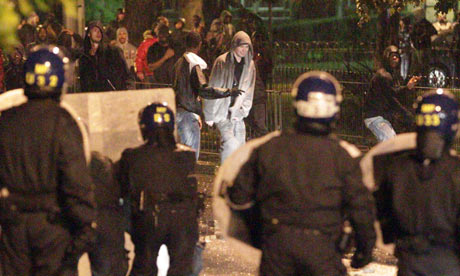Rioters interviewed for our study say they sought retribution for what they saw as police abuse of power in their communities.

Police clash with youths in Brixton, south London, during the riots. Policing was viewed as an ‘important factor’ in why the riots happened.
“The police is the biggest gang out there.” This view of the police, or variations of it, emerged frequently in 270 interviews of people who took part in August’s riots across cities in England.
Of those participants questioned for the Reading the Riots study, a Guardian/London School of Economics project, 85% said policing was an “important” or “very important” factor in why the riots happened.
Again and again, rioters from different parts of the country described the police as a “gang”, claiming its officers enforced a law they themselves played fast and loose with. Complaints included claims of being beaten up in police vans and “stitched up” over offences people were innocent of, but more often related to stop and search and the basic incivility police were accused of displaying in everyday interactions with communities.
The worst street disturbances in decades were, according to many of the people who caused them, “anti-police” riots. Researchers were aware that wider anti-state sentiments might crystallise around negative comments about the police, but in many cases interviewees had specific stories, some dating back to their childhoods, in which they claimed to have been treated unjustly.
[…]















